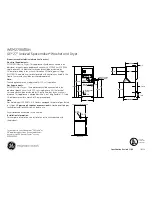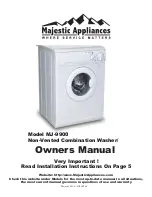
45
TROUBLESHOOTING
ENGLISH
Operation
Banging noise when
the washer is filling
with water. (Water
hammer)
Plumbing in the home moves or flexes when the water valves in the washer shut off.
• Water hammer is not caused by a defect in the washer. Install water hammer arrestors
(purchased separately at hardware or home improvement store) between the fill hose and
the washer for best results.
Household water supply pressure is very high.
• Adjust household water supply regulator to a lower pressure or contact a plumber.
Problem
Possible Cause & Solution
Water Leaking
Hoses are not connected correctly.
• Check hoses and connectors for leaks, cracks, and splits.
• Check and tighten hose connections.
House drain pipes are clogged.
• The washer pumps out water very rapidly. Check for water backing up out of the drain pipe
during drain. If water is seen coming out of the drain, check for proper drain hose
installation and check for restrictions in the drain.
• Contact a plumber to repair drain pipe.
Drain hose has come out of the drain connector or is not inserted far enough.
• Tie drain hose to inlet hose or standpipe to prevent it from coming out during drain.
• For smaller drain pipes, insert the drain hose into the pipe as far as the drain hose flange.
For larger drain pipes, insert the drain hose into the pipe 1 - 2 inches past the flange.
Oversudsing of detergent
• Oversudsing may create leaks, and may be caused by the type and amount of detergent
used. HE (High-Efficiency) detergent is the only detergent recommended. The normal
amount of detergent to use is 1/4 to 1/2 of the maximum amount recommended by the
detergent manufacturer.
• Always reduce the amount of detergent if the load is small or lightly soiled, or if the water
is very soft.
• Never use more than the maximum amount recommended by the detergent
manufacturer.
Excessive sudsing
Too much detergent or incorrect detergent
• HE detergents are formulated specifically for HE (High-Efficiency) washers and contain
suds reducing agents. Only use detergent with the HE (High-Efficiency) logo.
• For detergent quantities refer to
Detergent Use
in
OPERATION
. If sudsing or detergent
residue continues to be an issue, add an extra rinse.
Washer will not turn
on.
Power cord is not properly plugged in.
• Make sure that the plug is plugged securely into a grounded, 3-prong, 120-VAC, 60 Hz
outlet.
House fuse is blown, circuit breaker has tripped, or power outage has occurred.
• Reset circuit breaker or replace fuse. Do not increase fuse capacity. If the problem is a
circuit overload, have it corrected by a qualified election.
Wash cycle time is
longer than usual.
The washer automatically adjusts the wash time for the amount of laundry, water
pressure and other operating conditions.
• This is normal. The washer adjusts cycle time automatically to provide optimal results for
the selected cycle. The time remaining shown in the display is only an estimate. Actual time
may vary.
Problem
Possible Cause & Solution
















































